How to Build an Incredible Career From Scratch—When Nobody Thinks It’s Possible
The year 2010 was a vastly different time. A decade ago, chef and wellness expert Candice Kumai moved to a new city with little more than a dream and a suitcase. After years of hearing "no," she created her own path to "yes." Now, her career involves cooking, writing, and interviewing people all over the world. Here, she reflects on her process—and shares the lessons that helped her achieve her dreams.
Ten years ago, my Japanese mother said to my face, “You can’t make a living off of cooking. You can cook for your friends, but you can’t cook for a living.” And with that, my decade of dreams was born.
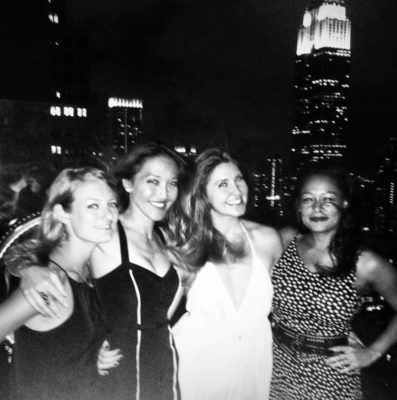
In September 2010, I moved from my safe harbor of Los Angeles to New York City to pursue my dreams of becoming a writer. I left everything that was comfortable to me: a boyfriend, the beautiful home we shared, my car, my surfboards, my family, my best friends, and lucrative modeling jobs.
Days before I booked my one-way ticket, I had $200 in my bank account, a few close friends in NYC, and one suitcase. That was it. Most of my cash was gone from paying my own way through culinary school, but that didn’t stop me. I got a studio on Avenue C in the grittiest part of the East Village, next to a squat house. For years, I couldn’t afford a TV or furniture.
I always made left turns when everyone went right. I was told “no” most of the time. I was discouraged from writing about Japanese food, and I was discouraged to be myself. I didn’t fit the mold of what people thought chefs/writers "should" look like at the time. A few TV networks and production companies dragged me through the mud. A cold, thick, and treacherous mud.

{{post.sponsorText}}
But somehow I always seemed to come out of the mud golden. I reminded myself of why I got started in the first place. It helped me redirect my course and shift sails when needed. When I lost, I learned and grew. I got better, smarter, hotter, and more consistent with age in every way possible.
A few years into NY, broke and barely making rent in a gritty part of Brooklyn, I began writing. Television and production would always be out of my creative control, so I chose to do things my own way, I ran my own media corporations. I had to prove myself.
For me, that meant redirecting my focus as a writer and author. I tapped into my creative freedom and started writing for Well+Good almost 10 years ago. Melisse, Alexia (the Well+Good founders) and I were some of the first pioneers in wellness. It was an industry that was touted as “never gonna make it” and had “low or no budgets.”
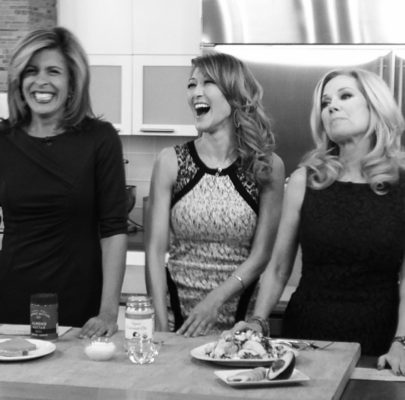
We gave wellness a graceful yet hard push. We stood up for real food, we wrote and developed until we went broke, we took centerstage on all the morning shows, we published books, we did research on the field. I *actually* cooked on the line and got my ass kicked in real kitchens. We created the magazine coverlines. There was no fake “insta” anything. It was all hard, real and honest. We cared about the work we put out there.
At work, I showed everyone what I could do, especially when they told me I couldn’t do it. My catalyst for success was being the underdog and making something brilliant out of absolutely nothing. It wasn't easy. Those tatted-up, sometimes egotistical male chefs dominated my space the entire decade. Some made passes at me, and others talked shit to my face. Still, I did what I believed was right, and I did what I loved—even when it broke me. I put in the time. I put in the work.
At work, I showed everyone what I could do, especially when they told me I couldn’t do it.
In time, these same chefs and media figures started respecting me and my work. This golden surfer girl who cooked on the line in California, who scraped her savings, who worked until two or three a.m. most nights—she took the whole cake. I worked as a respected columnist, I became an editor-at-large and a correspondent, and I wrote six best-selling books in a handful of years. I proved my skills were sharp.
I wouldn’t change anything, not even the painful parts. They shape your character and keep your integrity. My friend Rumi once told me, “Don’t give up before the miracle.” I've learned that even if my path might be more difficult, I could always have my dignity and do no harm.
Today, I realize that I am not the only person pursuing a dream—and that other people are striving toward realizing their own goals. I'm sharing some of the most powerful lessons I learned over the past 10 years, in hopes that they may help make this your decade of dreams.
Surround yourself with good people
Friends can support, believe, laugh with you, uplift and keep you weird—especially when you’re down in the dumps. I am deeply grateful for the friendships that held up in my darkest times.
So keep the circle that keeps you uplifted, inspired and positive. Lose the ones who judge you, discourage you, or tell you how to live your life. There’s no reason to keep anyone around who makes you feel hard to be loved. You can forgive people and not hold a place for them anymore. That’s okay.
Also, be honest with yourself about how you provide friendship. I tried to apologize when I was not my best. Listen more, reflect and work through your friendships.
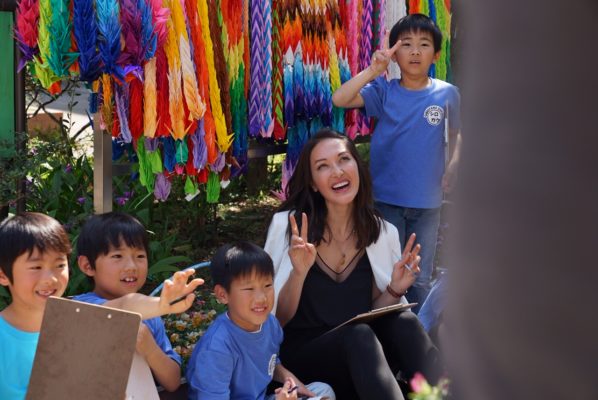
See life through a different lens
Better journalism is living it, not just writing or showing up. Spending time with the kids of Nagasaki and Tokyo was my greatest pleasure of the decade. It was at once a miracle and a painful memory to hang with the children at Shiroyama Elementary school on an assignment for NHK, a Japanese television network. It was an honor and a privilege to share laughter and culture on the school grounds of a once completely demolished by the A-Bomb.
I often pondered whether the elderly and the offspring of Nagasaki and Hiroshima were possibly here to show us many deep and profound lessons. We can take time to better recognize our history, to learn from our elders, from those who have survived trauma. We can choose to value those off social media and pay attention to what’s important in real life. More of these stories are coming up this year in my docu-series, “Kintsugi.” Taking the time to better recognize our history, to learn from our elders and from those who have survived trauma, and to hear people’s stories off social media will show you what’s really important in life.
Another way to grow and learn? Pick up a non-fiction memoir this year to try and see things from another person’s shoes. My current fave: Denali by Ben Moon.
Adapt, accept, change
Technology, smartphones, work, and relationships have evolved vastly in the last 10 years—and instead of complaining or comparing, it's better to adapt and adjust.
Keep Darwin’s theory in mind: It is not the most intellectual of the species that survives; it is not the strongest that survives; but the species that survives is the one that is best able to adapt and adjust to the changing environment in which it finds itself.
Complaining or comparing won’t do any good; practice acceptance, breathe deeper, and reflect more on the things that matter. Be willing to adapt to change.
I recommend doing this by practicing acceptance, breathing deeper, and reflecting on the things that matter. You can turn your phone off every evening or on weekends and tune back to real life, while still adapting to the present. Go out with a friend, on a workout or a hot date, and don’t bring your phone.
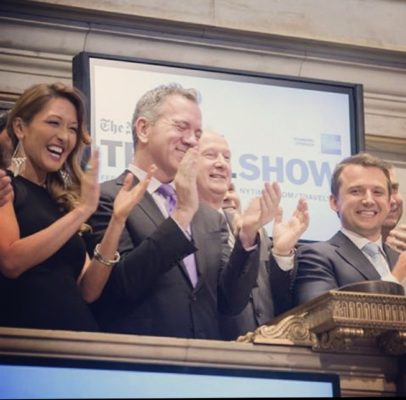
Give yourself time and space
I began to give myself more time and space to clear my thoughts. Every morning, I made time for matcha and breathing while gazing into the sunrise. I made a point to admire flowers or nature each morning before turning my phone on. I spoke to friends and my therapists. The more time and space I had while traveling and or surfing, hiking, writing, the more I realized this: I worked on myself to better my heart and mind. There is no rush, only time and space.
Know your values
Money, beauty, greed, power: these are things our society deems as important. My dad taught me that the rat race isn’t what life is about; sometimes when you get to the top, you’ll look around and realize it’s not even where you wanted to be.
Value character, integrity, grace, kindness, and people who don’t expect anything in return. Value people doing good work off social media and praise them. I mostly value affection, time with friends off our phones, and the warm feeling of love. (Sometimes this feeling in particular is a side effect of whisky or mezcal nights, but still.) Find out what you value most, write it down, stick to that list, and don’t waver. Check out my cute 2020 Wabi Sabi Planners for organizing all your values on paper this year.
Believe that everyone is doing their best
We're all on different paths in life, and everyone's got a battle they're fighting. I choose to believe that everyone is doing their best. This helps me avoid rushing to judgment or taking things personally.
And know that when you thrive, some people may feel uncomfortable. They may even resent your success, especially if they haven't seen how hard you had to work for it. But again, when you choose to believe that everyone is doing their best, your success will also attract a higher vibe and supportive friends. Go with that.
Travel alone, if you can
If I look at the one practice that helped me the most in the past decade, it was solo travel. Packing my bags to head off on an unknown journey, I turned my phone off for days and got lost in the forests, at the temples, with the monks. I am grateful for every person I’ve met along the way. They were crazy, fun, wise, humbled, playful, joyful, and unexpected. Beauty is found in all of these little surprises, but mostly in the people.
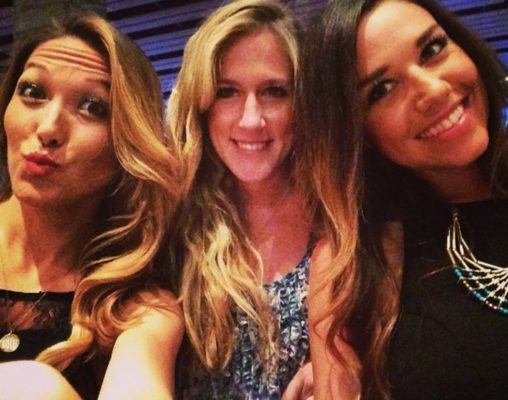
Give thanks
During most of my twenties, I was a total party girl who did what she wanted. Years later, I now pay more attention to the things that matter. I am grateful for the people in my life, the opportunities in my life, and my health. I encourage you to say "thank you" out loud every now and then—and send a note of gratitude to someone who has shaped your life for the better. Helping others along the way is also giving thanks, so pay it forward when you can.
Always choose the high road
Even when it sucks. It’s always worth it.
Be open to love
I’ve had three long, serious, and beautiful relationships. I cherish what we had, I learned from the experiences, and I don’t regret a thing.
I grew to love myself more and somehow I forgave all the bad things. I am not perfect; my partners weren’t perfect. So I accepted what I couldn’t change. When I wanted a relationship to work, but it fell apart, I could feel the sting from the back of my eyes watering, deeply—but I always found a way to gracefully put things back together. This means that you can do the same. This is the anthem of kintsugi.
Love has no timeline. So fall harder, faster, deeper, wider…and have more fun! For what is life if it is not lived with love? The crazy part is, I’d do it all over again. All 10 gutting, glorious years.
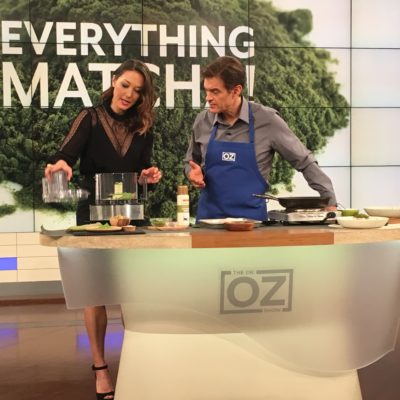
Let pain help you grow
My mother taught me that in life, there will be grief, loss, depression, sadness. In Japanese, we call this mono no aware: the pathos of life. Many unjust things can happen. Life’s greatest contrast is in paying attention to the dark and the light, for one cannot exist without the other. I grew with each of those unjust moments. That’s how you pave a new path.
There’s no rush, there are no rules, there’s no timeline.
Somehow that mud beneath my feet wasn’t as thick or cold as I initially thought after all. It was just there to teach me many profound lessons.
So know that it's okay that your heart aches, if your bank account is drained, if you're not chipper every single day, or if you're not where you want to be. It's okay if things broke into a million pieces. It can be fixed.
Money will be made, hearts will be mended, time will show you who wants to be there, space will show you where you’re meant to be.
There’s no rush, there are no rules, there’s no timeline. There’s just a little gift of reflection, time, and space.
Give yourself the gift of freedom. Enjoy it.
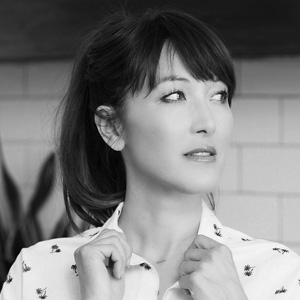 Candice Kumai is an internationally renowned wellness writer and chef is a five-time, best-selling author. A Top Chef alumna and Food Network guest, she's appeared as a judge on Iron Chef America and Beat Bobby Flay. Candice is a former model, a lover of vegan cake baking, a matcha fan, and a total sneakerhead. In her downtime, she enjoys avocados, her cat Sis, and barre. Her new book, Kintsugi Wellness, is out now.
Candice Kumai is an internationally renowned wellness writer and chef is a five-time, best-selling author. A Top Chef alumna and Food Network guest, she's appeared as a judge on Iron Chef America and Beat Bobby Flay. Candice is a former model, a lover of vegan cake baking, a matcha fan, and a total sneakerhead. In her downtime, she enjoys avocados, her cat Sis, and barre. Her new book, Kintsugi Wellness, is out now.
What should Candice write about next? Send your questions and suggestions to experts@www.wellandgood.com.
Loading More Posts...